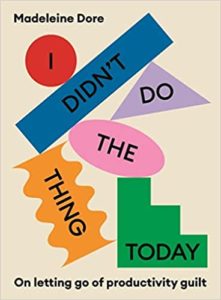 Resonate. Now, there’s a word. I Didn’t Do the Thing Today: On Letting Go of Productivity Guilt rang so many bells for me I’m still hearing them.
Resonate. Now, there’s a word. I Didn’t Do the Thing Today: On Letting Go of Productivity Guilt rang so many bells for me I’m still hearing them.
Madeleine Dore begins:
While I don’t know the particular shape your days take, there are things we all stumble over as we try to navigate modern life…each of us is entangled in a culture that measures our value through productivity – how much we do, how well we do it, whom we do it for. For many of us, our days have become containers for internalised capitalism, or the pervading sense that what we do is tied to our worth.
She goes on to talk about the undercurrent of guilt, anxiety and shame many of us live with…because we didn’t do the thing today.
Oh, yes. For most of my adult life, I’ve done a good line in self-bullying. In a culture that’s become more and more about ‘self-optimisation’, I’ve tried and failed to find the the perfect routine, planner, diary, time-management technique, hack, short-cut, seminar, product. Things work a treat…and then they don’t. I’ve tried and failed to exert more willpower, more discipline, more focus and drive. Sometimes I can, sometimes I can’t.
Dore makes the point that rather than making our lives better, this obsession with ‘doing’ leaves many of us feeling inadequate, stressed and burned out. Being busy doesn’t mean you’re being efficient, and efficient doesn’t always equate with effective. I remember my peak mothering and caring years; I’d ask friends and acquaintances how they were, and the reply was always, “busy” but it was understood that busy was actually a badge of honour. I’d nod, agree, me too. Rarely, I’d confess that I hated being busy. Always have. Humming along is good, but like most of us, I am not at my best when I am overly busy. I’d guess that my many weeks of illness as a small schoolchild – I was an URTI kid, with ‘chesty colds’ turning into pleurisy my speciality – were my body’s way of saying no. Stop. That’s enough.
The book contains a distillation of Dore’s research, reading, observations and insights, many of which have come via conversations with (mainly) creative types for her blog and podcast Extraordinary Routines. She starts with a gentle invitation to explore what works for us. To look into our contradictions, our changing wants, our limitations.
And give yourself permission to change your own mind as your days change, too.
Perhaps really I knew this anyway, but it’s good to have it hammered in to my brain: perfection doesn’t exist. Furthermore, going after it is just self-defeating and harmful.
As Dore reiterates, there are messy days, disorganised days, days when the unexpected (delightful or terrible) happens. A couple of weeks ago, a bronze-wing pigeon flew full-tilt through a large window in our house, killing itself and leaving shards and daggers of smashed glass everywhere. No one was hurt, but a half a day of disruption and effort (ring the insurer, find a glazier, organise a time, confer with the tradesman, etc etc) followed. Some nights, I don’t sleep more than a couple of hours. So the next day is unlikely to be peak writing time.
Just as no two of us are the same, neither are our days and the moments within them. Embrace them as they are, and as you are. After all, the most meaningful lives, I’ve learned, are often not the extraordinary, the perfect or problem-free ones – they’re the ordinary ones lived with creativity, curiosity, kindness and joy. Maybe that’s all we really need to do today, to find something to value within. Something to be curious about, something to love something to learn. That something might just be everything.
Dore has the grace to recognise that she’s not speaking to everyone. She acknowledges the urgent necessity to pick up tasks you cannot just put down, such as working to support a family, or caring for children or aged parents. Like so much of the self-help genre, this is aimed at people lucky enough to be able to take a step back.

One of the positives that has come from the lockdown for me was the permission to take it easy on myself — it was so hard just to keep afloat during a pandemic, what did it matter if I didn’t meet my writing goal today? It’s good to be reminded to be gentle with ourselves. Is a day really ‘wasted’ if we spend it doing things we enjoy, even if they’re not ‘productive’? What is life for, anyway??
I’m learning to have very flexible writing goals, Kate! And I am finding that if I look at my work over a fortnight or a month, despite what I might think of as bad days, there ARE more pages; the book is getting written. During the times when I’m not forging ahead, I remind myself that the revising and polishing is valuable. I wish I could just look at past performance and feel sunny and confident that I’ll succeed, but I do get the jitters. It seems to be part of the job for me.